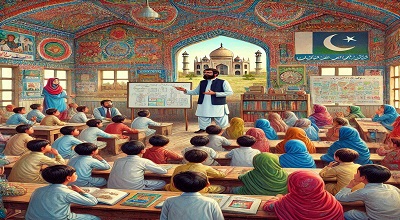Education System in Pakistan
The education system in Pakistan is a complex and diverse one, with different levels, types, and standards of education. According to Wikipedia. The education system in Pakistan is generally divided into six levels:
- preschool (for the age from 3 to 5 years),
- primary (years one to five),
- middle (years six to eight),
- high (years nine and ten, leading to the Secondary School Certificate or SSC),
- intermediate (years eleven and twelve, leading to a Higher Secondary School Certificate or HSSC),
- and university programs leading to undergraduate and graduate degrees.
The Federal Ministry of Education and the provincial governments are responsible for overseeing the education system in Pakistan. While the Higher Education Commission established in 2002 is in charge of all universities and degree-awarding institutes. The Constitution of Pakistan obligates the state to provide free and compulsory quality education to children of the age group 5 to 16 years. However, Pakistan still faces many challenges and gaps in providing universal and equitable access to education for all children, especially the most disadvantaged and marginalized groups.
According to UNICEF:
Pakistan has the world’s second-highest number of out-of-school children (OOSC) with an estimated 22.8 million children aged 5-16 not attending school, representing 44 percent of the total population in this age group. The literacy rate in Pakistan is also low compared to other countries, with significant disparities based on gender, socio-economic status, and geography. Moreover, Pakistan has a shortage of qualified teachers, adequate infrastructure, and reliable data systems to monitor and improve the quality and outcomes of education.
To address these issues, UNICEF supports the Government of Pakistan’s efforts to reduce the number of OOSC at pre-primary, primary, and lower secondary levels, by focusing on early childhood education (ECE), alternative learning pathways (ALP), and school-community linkages. UNICEF also contributes to more equity-focused provincial sector planning and budgeting, strengthening data and assessment systems, and evidence-based policy advocacy.
The education system in Pakistan:
ESP is also influenced by international trade and market demands. According to the International Trade Administration, many of the private schools in Pakistan offer the Cambridge education system in conjunction with the nationally mandated curriculum. Pakistan also produces about 445,000 university graduates and 25,000–30,000 computer science graduates per year.
Which creates a potential pool of talent for the global economy. However, the education system in Pakistan also faces some problems and solutions that need to be addressed. According to a report by the Institute of Policy Research Islamabad, some of the major issues include lack of political will and commitment;
- low public spending on education
- poor governance and management
- corruption and inefficiency
- outdated curriculum and examination system
- low quality of teaching and learning
- inadequate physical facilities
- social and cultural barriers
- gender discrimination; regional disparities
- religious extremism and external influences.
Some of the suggested solutions include:
- increasing public expenditure on education
- improving governance and accountability
- reforming curriculum and assessment
- enhancing teacher training and professional development
- providing equitable access and opportunities
- promoting social cohesion and tolerance
- strengthening public-private partnership
- engaging civil society and media
- fostering innovation and research
- and harmonizing national and international standards.
What is the literacy rate in Pakistan?
According to the data from the Ministry of Federal Education and Professional Training, the current literacy rate of Pakistan is 62.3%, which means that an estimated population of 60 million is illiterate in the country. This is based on the latest economic survey of 2022. The literacy rate measures the percentage of people aged 15 and above who are able to read and write.
In 2019, Pakistan’s total literacy rate was around 58%, with less than 46.49% of women being literate and more than 69.29% of men. There are significant disparities based on gender, socio-economic status, and geography in the literacy rate of Pakistan. The literacy rate also varies by province, with Punjab having the highest rate of 67.7%, followed by Sindh with 62.2%, Khyber Pakhtunkhwa with 55.3%, and Balochistan with 55.5%.
Pakistan faces many challenges and gaps in providing universal and equitable access to education for all children, especially the most disadvantaged and marginalized groups. Pakistan has the world’s second-highest number of out-of-school children (OOSC) with an estimated 22.8 million children aged 5–16 not attending school, representing 44 percent of the total population in this age group. The literacy rate in Pakistan is also low compared to other countries which is one of the core reasons for the slow growth and destructive economy of the country.
